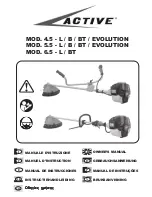
8
English
䡬
Take care not to allow the power cord to come into
contact with the diamond wheel during operation.
䡬
When the work is completed, turn the power off and
disconnect the power plug from the receptacle.
MAINTENANCE AND INSPECTION
1. Inspection the diamond wheel
A worn diamond wheel overloads the motor and
reduces working efficiency. Replace with a new one.
2. Diamond wheel clogging
The rate of wear of the diamond layer cutting edge
will vary depending on the type of material being
cut, the cutting speed, etc. In general, materials
which produce granular cutting particles may scrape
the bodying agent and hasten the wear of the
diamond layer. On the other hand, materials which
produce powdery cutting particles may cause
clogging of the diamond layer which will reduce
cutting efficiency. When clogging occurs, additional
force applied in an attempt to increase cutting speed
will sometime cause sparks to appear around the
circumference of the diamond wheel. In such a case,
stop using the cutter and carefully inspect the cutting
edge by rubbing it with your fingers. If the diamond
layer feels smooth (no roughness or abrasiveness),
it is clogged with dust and must be “dressed”.
For thorough dressing, approximately 5 meters of
slightly accelerated cutting at a depth of 10mm in
a relative soft material which produces granular
cutting particles (such as a cement block or brick)
will restore the cutting effectiveness of the diamond
layer and will extend the service life of the diamond
wheel.
The diamond material is susceptible to high
temperatures and will begin to deteriorate at
approximately 600°C. Higher temperatures will cause
decomposition of the diamond material. Accordingly,
it is important to perform “dressing” as soon as
clogging or sparking occurs.
3. Inspecting the mounting screws
Regularly inspect all mounting screws and ensure
that they are properly tightened. Should any of the
screws be loose, retighten them immediately. Failure
to do so could result in serious hazard.
4. Maintenance of the motor
The motor unit winding is the very “heart” of the
power tool.
Exercise due care to ensure the winding does not
become damaged and/or wet with oil or water.
5. Inspecting the carbon brushes (Fig. 5)
The motor employs carbon brushes which are
consumable parts.
When they become worn to or near the “wear
limit”, it could result in motor trouble. When an
auto-stop carbon brush is equipped, the motor will
stop automatically.
At that time, replace both carbon brushes with new
ones which have the same carbon brush numbers
shown in the figure. In addition, always keep carbon
brushes clean and ensure that they slide freely within
the brush holders.
6. Replacing carbon brushes (Fig. 6)
<Disassembly>
(1) Loosen the D4 tapping screw retaining the tail cover
and remove the tail cover.
INSTALLING DUST COLLECTION HOSE
When cutting a material which generates cutting dust,
use the dust collection hose as follows:
(1) Remove the rubber cap and install the accessory
adaptor. (
Fig. 3
)
(2) Install the dust collection hose for the power tool
in the accessory adaptor. (
Fig. 3
)
CAUTION
䡬
Always install a rubber cap on the dust collection
adaptor when the dust collection hose is not used.
INSTALLING/REMOVING DIAMOND WHEEL
1. Installation
(1) Remove the cover (A).
(2) Wipe the cutting dust from the spindle and washers.
(3) Make sure the rotation direction of the diamond
wheel conforms to the direction indicated on the
gear case and install the diamond wheel as shown
in
Fig. 1
.
(4) Press the lock pin and secure the spindle. Tighten
the wheel nut adequately with the provided wrench.
(
Fig. 1
)
NOTE
䡬
Always use the provided wrench to secure the wheel
nut.
2. Removal
Remove the wheel nut with the provided wrench
and remove the diamond wheel. (
Fig. 1
)
CUTTING
1. Cutting procedures (Fig. 4)
(1) Place this tool on the material to be cut and align
the cutting line and the diamond wheel.
The cutting can be performed smoothly if you cut
straight ahead on the cutting line in the initial cut.
(2) Turn on the switch when the diamond wheel is not
touching the material to be cut.
2. Precautions immediately after finishing operation
After switching off the machine, do not put it down
until the depressed center wheel has come to a
complete stop. Apart from avoiding serious accidents,
this precaution will reduce the amount of dust and
swarf sucked into the machine.
CAUTION
䡬
Always check the diamond wheel before starting
work. Never use a diamond wheel which is cracked,
broken or bent.
䡬
Do not apply water or coolant to the diamond
wheel.
䡬
Start cutting only when diamond wheel reaches its
maximum speed.
䡬
If the diamond wheel seizes or there is any abnormal
noise, immediately turn the power off.
䡬
Never use the diamond wheel to cut zigzag or
curved lines. Never use the side surface of the
diamond wheel. Never use to perform inclination
cutting.
䡬
If excessive force is applied to the diamond wheel
to make it align with the cutting line during cutting,
this might not only overload the motor and cause
burn damage but may also overheat the diamond
wheel and shorten the service life.











































